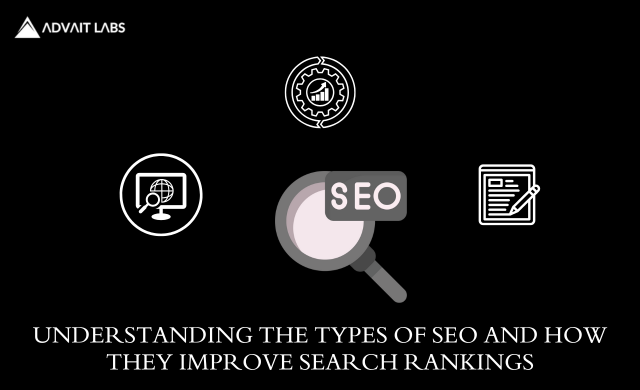Types of SEO in Digital Marketing: On-Page, Off-Page & More

In today’s digital-first world, visibility is everything. Businesses that want to grow online must understand the types of SEO that impact how their website ranks on search engines. At Advait Labs in Hyderabad, we’ve seen firsthand how smart SEO strategies can transform a business from being invisible online to becoming a recognized leader in its industry.
So, what exactly are these types of SEO? In this blog, we’ll break them down—covering what is on page SEO, what is off page SEO, and other essential strategies that can help you use relevant keywords effectively and rank higher in search results.
Why Understanding Types of SEO Matters
Search Engine Optimization (SEO) isn’t just about stuffing pages with keywords. It’s about creating a website that both search engines and users trust. Knowing the different types of SEO allows you to approach optimization in a structured way—balancing content, technical elements, and credibility.
1. On-Page SEO
What is On Page SEO?
On-page SEO refers to all the optimization you do directly on your website. This includes writing high-quality content, using relevant keywords naturally, and structuring your web pages so that both users and search engines understand them.
Key Elements of On-Page SEO
- Keyword Optimization: Using the right keywords in titles, headings, and body text. For example, if your page targets “types of SEO,” that phrase should appear naturally across the content.
- Meta Tags: Crafting clear, keyword-rich meta titles and descriptions that encourage clicks from search results.
- Content Quality: Publishing original, valuable, and well-structured content.
- Internal Linking: Connecting related pages within your website to help users and search engines navigate easily.
On-page SEO lays the foundation for every other type of optimization. Without it, other strategies won’t deliver maximum results.
2. Off-Page SEO
What is Off Page SEO?
Off-page SEO refers to all activities that happen outside your website but influence its authority and rankings. The most important factor here is building backlinks from trusted sites.
Key Elements of Off-Page SEO
- Backlink Building: Acquiring links from authoritative websites in your niche.
- Brand Mentions: Even when your site isn’t linked, mentions of your brand build trust signals.
- Social Media Engagement: Sharing your content on social platforms to expand visibility and credibility.
- Influencer Marketing: Collaborating with influencers to reach wider audiences.
In simple terms, if on-page SEO is about making your website valuable, off-page SEO is about proving to Google and other search engines that others also see it as valuable.
3. Technical SEO
Technical SEO ensures your website is built in a way that search engines can easily crawl and index it.
Key Elements of Technical SEO
- Website Speed: Fast-loading websites provide better user experience.
- Mobile Friendliness: With most users browsing on mobile, responsive design is a must.
- XML Sitemaps: Help search engines navigate and understand your site structure.
- Secure HTTPS: Security is now a ranking factor.
Technical SEO often works behind the scenes, but it’s crucial. A slow or poorly structured website can hurt your rankings even if your content is excellent.
4. Local SEO
If your business serves specific locations, Local SEO is essential. It focuses on optimizing your online presence to attract nearby customers.
Key Elements of Local SEO
- Google Business Profile Optimization
- Local Keywords (e.g., “SEO services in Hyderabad”)
- Customer Reviews and Ratings
- Local Citations
For example, businesses like Advait Labs in Hyderabad rely heavily on Local SEO to connect with nearby companies looking for expert SEO solutions.
5. Content SEO
This type focuses on creating valuable, relevant, and keyword-optimized content. It overlaps with on-page SEO but deserves its own category because high-quality content remains the backbone of ranking.
- Blog posts, guides, and case studies with keywords naturally included.
- Using headers, bullet points, and visuals to enhance readability.
- Updating old content to keep it fresh.
6. Other Types of SEO
Beyond the major ones, there are other forms of SEO worth mentioning:
- E-commerce SEO: Optimizing online stores and product pages.
- Voice Search SEO: Targeting conversational queries people ask digital assistants.
- Video SEO: Optimizing video content for platforms like YouTube and Google search.
Bringing It All Together
Understanding the types of SEO—on-page, off-page, technical, local, and content—equips you with the tools to grow online visibility. Whether you’re just starting or looking to refine your strategy, combining these approaches helps you build long-term success.
At Advait Labs Hyderabad, we believe SEO isn’t just about ranking. It’s about connecting your brand with the right people at the right time.
FAQs on Types of SEO
1. What is On Page SEO and why is it important?
On-page SEO means optimizing everything within your website—content, keywords, headings, and meta tags. It’s important because it ensures your site is understandable to both users and search engines.
2. What is Off Page SEO in simple terms?
Off-page SEO includes all the efforts outside your website, like backlinks, social media, and brand mentions, that increase your website’s authority and trustworthiness.
3. How many types of SEO are there?
The main types of SEO include on-page SEO, off-page SEO, technical SEO, local SEO, and content SEO. Depending on your business, you may also need e-commerce SEO, video SEO, or voice SEO.
4. How can Advait Labs in Hyderabad help with SEO?
Advait Labs specializes in providing tailored SEO strategies—including on-page, off-page, and technical SEO—helping businesses in Hyderabad and beyond improve their online presence.
5. How do keywords help in SEO?
Keywords help search engines understand what your content is about. Using relevant keywords naturally across your content increases your chances of ranking higher.
